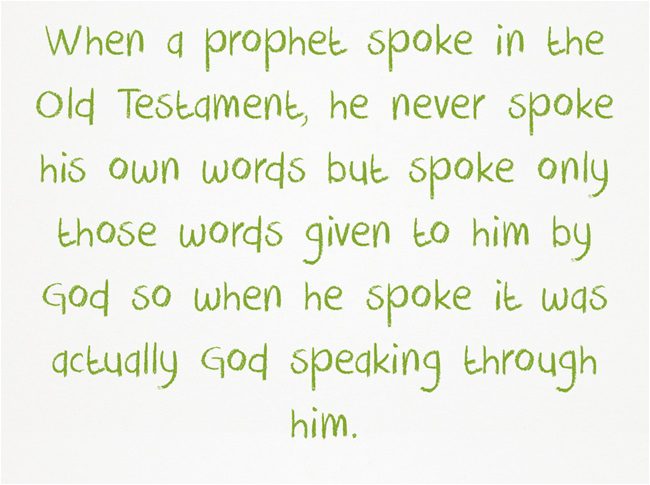What did it mean to be a prophet of God? Where there prophets only in the Old Testament or were there some in the New Testament? What about today, are there prophets today?
The Old Testament Prophet
When a prophet spoke in the Old Testament, he never spoke his own words but spoke only those words given to him by God so when he spoke it was actually God speaking through him. There are many Old Testament prophets and they usually prophesied events that were far into the future (Dan 12) but not always. Sometimes the prophet would speak things that would come shortly to pass (2 Kings 2:3). In other cases, as with the prophet Isaiah, many of his prophecies would come hundreds of years later (Isaiah 53) but some have yet to be fulfilled (Isaiah 60).
Moses was told that Aaron would be a prophet for Israel (Ex 7:1) but God also spoke to Moses about a prophet to come and that “I will put my words in his mouth, and he shall speak to them all that I command” (Duet 18:18) and this was speaking about Jesus. God tells all of the prophets that they are to speak only the words that He gives them (Ezk 2:7) and never anything that comes from their own mind. God spoke through Amos that “the Lord GOD does nothing, without revealing his secret to his servants the prophets. A lion has roared! Who will not fear? The Lord God has spoken! Who can but prophesy” (Amos 3:7-8)
The Hebrew word for prophet as a noun is “nabiy” which matches just what I wrote because this word means “a spokesman” and “a speaker” and they are spokesman and a speaker for God. When the word prophet is used as a verb, like in Amos 3:8 it is the Hebrew word “naba” which means “to prophecy or speak”, “under the influence of the divine spirit.” So these prophets were God’s spokesmen but they spoke or prophecies only “under the influence of the divine spirit” and never under human influence and there are over a thousand times that the Bible says “Thus says the Lord.” How could the people know whether a prophet was from God or not? The way to know was recorded by Moses in Deuteronomy 18:20 that serves as a warning even today about so-called prophets who are not really prophets at all: “But the prophet who speaks a word presumptuously in my name which I have not commanded him to speak, or which he speaks in the name of other gods, that prophet shall die.” There is no “three strikes and you’re out” but you are allowed one chance and if you are a false prophet then you died.
The New Testament Prophet
The age of the Old Testament prophets actually comes at the beginning of Christ’s ministry and it is found in the New Testament. John the Baptist was the last of the Old Testament prophets as it says in Matthew 11:8-15
“A man dressed in soft clothing? Behold, those who wear soft clothing are in kings’ houses. What then did you go out to see? A prophet? Yes, I tell you, and more than a prophet. This is he of whom it is written, ‘Behold, I send my messenger before your face, who will prepare your way before you. ’Truly, I say to you, among those born of women there has arisen no one greater than John the Baptist. Yet the one who is least in the kingdom of heaven is greater than he. From the days of John the Baptist until now the kingdom of heaven has suffered violence, and the violent take it by force. For all the Prophets and the Law prophesied until John, and if you are willing to accept it, he is Elijah who is to come. He who has ears to hear let him hear.”
In the New Testament the Greek word for prophet is “prophetes” which means “an interpreter of oracles” and the oracles here are the words of God. When the word is used as one of the gifts that some in the church had this Hebrew word was “propheteia” which means “a discourse” and the Christian’s teachers that were said to have the gift of prophecy really didn’t predict the future but it was an endowment from God and the speech was that of the Scriptures. So the prophet of God was not so much a predictor of future events but someone that spoke for God and exhorted and directed the church.
When someone is said to give a prophecy or be a prophet in the New Testament the common meaning should be understood that they are not predicting the future but as the Greek compound meaning of the words help define what it actually is: The Greek “pro” means “before” while the “phḗtēs” or sometimes “phemi” means “to make clear, to assert as a priority” so those who had the gift of prophecy in the New Testament weren’t prophesying what would happen in the future to the church or Christians but what was clarified beforehand or “pro” (e.g. in the Scriptures) was made clear or “phetes” so that what was clarified beforehand involved divinely-empowered forth telling (asserting the mind of God) or foretelling.
Conclusion
I can predict your future without being a prophet but I can foretell what your future holds most certainly if you are not saved by the time you die or before Christ returns. Let me make clear from the Scriptures what was clarified beforehand for you in Revelation 20:12-15
“And I saw the dead, great and small, standing before the throne, and books were opened. Then another book was opened, which is the book of life. And the dead were judged by what was written in the books, according to what they had done. And the sea gave up the dead who were in it, Death and Hades gave up the dead who were in them, and they were judged, each one of them, according to what they had done. Then Death and Hades were thrown into the lake of fire. This is the second death, the lake of fire. And if anyone’s name was not found written in the book of life, he was thrown into the lake of fire.”
I can also predict with 100% accuracy what will happen to you if you have repented, confessed your sins, and trusted in Christ for you will be among “those who are wise shall shine like the brightness of the sky above; and those who turn many to righteousness, like the stars forever and ever” (Dan 12:3).
Another Reading on Patheos to Check Out: What Did Jesus Really Look Like: A Look at the Bible Facts
 Article by Jack Wellman
Article by Jack Wellman
Jack Wellman is Pastor of the Mulvane Brethren church in Mulvane Kansas. Jack is also the Senior Writer at What Christians Want To Know whose mission is to equip, encourage, and energize Christians and to address questions about the believer’s daily walk with God and the Bible. You can follow Jack on Google Plus or check out his book Blind Chance or Intelligent Design available on Amazon
















